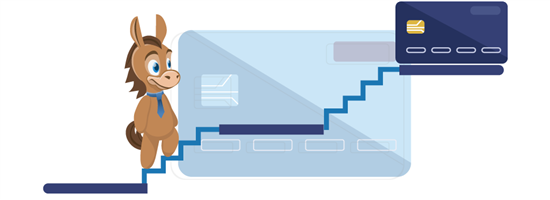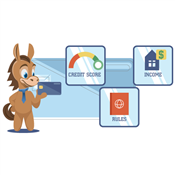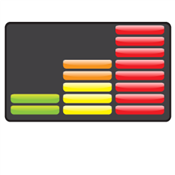How Hard Is It to Get a Chase Credit Card?
Ad Disclosure: This article contains references to products from our partners. We receive compensation if you apply or shop through links in our content. This compensation may impact how and where products appear on this site. You help support CreditDonkey by using our links.
How can you get approved for Chase credit cards? And how long does it take? Here are the easiest (and hardest) Chase cards to get.
 |
| © CreditDonkey |
- What is the Minimum Credit Score for a Chase Card?
- Is There an Income Requirement for Chase Cards?
- Reasons Why You May Get Denied
- Important Chase Application Rules
- How Hard Is It to Get Chase Sapphire Cards?
- How Hard Is It to Get Chase Business Cards?
- What Is the Easiest Chase Card to Get?
- How Long Does It Take to Be Approved?
Known for the great sign-up bonuses and rewards programs, Chase offers some of the best credit cards on the market. But you may have also heard that Chase is tougher when it comes to approval.
Just how hard is it to get a Chase credit card?
This comes down to the many factors that Chase looks at to determine approval, as well as some strict application rules that have nothing to do with your credit. Let's break them down.
MINIMUM CREDIT SCORE FOR A CHASE CARD
Chase credit cards come in a wide range, from beginner cards to premium travel rewards cards. In general, the lower tier cards require a fair credit score of at least 600, while the premium cards require an excellent credit score.
Credit cards such as Chase Sapphire Preferred® and Chase Sapphire Reserve® are at the premium end of the spectrum. These cards generally require higher credit scores of 720 and above.
Popular cash-back cards like Chase Freedom Unlimited® usually require a good credit score of around 680.
In general, if you have a score around 700 or higher, you have a pretty strong chance for being approved for the higher-tier rewards cards.
Read this article for a more detailed guideline of credit scores needed for Chase cards.
INCOME REQUIREMENT FOR CHASE CARDS
There is no official income requirement for Chase cards. However, Chase will consider your income in the decision process. Chase needs to make sure you can support the credit limit and annual fee (if any).
Some of Chase's cards have minimum credit limits. For example, the minimum credit limit for the Chase Sapphire Preferred is $5,000 (and $10,000 for the Sapphire Reserve). So if your income isn't high enough and Chase isn't comfortable giving you that much credit, then you won't be approved for the card.
REASONS WHY YOU MAY GET DENIED
Besides the credit score, here are some other factors that Chase will consider. These could be reasons why you don't get approved for a Chase card.
Too many new credit card accounts
If you've opened more than 5 new credit cards in the past 2 years (with any bank), you will be automatically declined for a new Chase card no matter how qualified you are. This is called the Chase 5/24 rule (more below).
Too many recent hard inquiries
People have reported being rejected because there were too many inquiries on their credit recently. This tells banks that you're desperate for credit. This could be explained easily, like if you're shopping for a new car.
Too new to credit
If you're very new to credit and don't have a history, Chase may be hesitant to issue you a card because they don't know yet if you can handle credit responsibly. Most of Chase's cards require that you demonstrate you can manage credit.
Too high credit utilization
This means how much of a balance you're carrying compared to your total limit. Ideally, you should never go over 30%. A high percentage is a signal that your income does not support your spending.
Too much credit with Chase
Chase usually has an overall amount of credit they're willing to give you based on your income and other financial factors. If you already have a couple of Chase cards, maybe you're nearing or already maxed out on the limit. In this case, you can ask if you can transfer some limit over to the new card.
IMPORTANT CHASE APPLICATION RULES
Chase has some strict application rules that may stop you from being approved for a new card, no matter how excellent your credit is.
Chase 5/24 Rule
This rule is the biggest reason why those with excellent scores don't get approved for a new card. This rule says that if you've opened 5 credit card accounts in the past 24 months (with any bank), you will not be approved for a new Chase card, even if you have a perfect score.
As of November 2018, ALL Chase credit cards are subject to this rule. There are no longer any Chase cards to which this rule does not apply.
Chase 2/30 Rule
This is another unofficial rule that says that you cannot be approved for more than 2 Chase cards within any 30-day period. Usually, this goes for 2 personal cards. Applicants have reported better luck being approved for 2 cards at the same time when the 2 cards are not from the same family (for example, a Chase Freedom Unlimited and a Chase co-branded card).
Chase Sapphire Rules
You cannot own more than one card in the Sapphire family. So, for example, if you already have the Sapphire Preferred and now want the Reserve, you will not be able to apply. In this case, you have to call customer service and either upgrade your current Preferred to Reserve, or close your Preferred account and apply to Reserve.
Welcome Bonus Rules
For most Chase cards, you will not be eligible to receive the welcome bonus offer if you have received a new cardmember bonus for the card in the past 24 months. For Chase Sapphire cards, this restriction goes up to 48 months.
HOW HARD IS IT TO GET CHASE SAPPHIRE CARDS?
The Chase Sapphire cards (Preferred and Reserve) are no doubt a couple of the most popular travel rewards cards on the market. With incredible sign-up bonuses, rewards, and benefits, they're highly coveted but (rightly so) not the easiest to get.
Typically, you'd need an excellent credit score of at least 720 to be approved for either of the Sapphire cards.
Because the Sapphire Reserve has a super-high $550 annual fee, approval will be stricter. Cardholders generally have higher income close to six digits, as Chase has to make sure your income can support the annual fee and higher credit limit. Preferred cardholders generally have income over $50,000.
HOW HARD IS IT TO GET CHASE BUSINESS CARDS?
Chase business cards are rumored to be harder to get compared to small business cards by other issuers. All Chase business cards have a minimum $5,000 credit limit.
Chase business cards usually require excellent credit, which means a score of 720 or more. Of course, this isn't the only deciding factor. Chase will also look at things like your type of business, annual revenue, and years in business.
It's uncommon to get an instant approval on Chase business cards. If you get the pending response, we recommend that you DON'T jump the gun and call reconsideration. That may actually hurt your chances as now you'll have to explain your business to an analyst. It's better to just wait for the system to process your application and then call recon after you've been denied.
EASIEST CHASE CARD TO BE APPROVED FOR
The easiest Chase cards to get are the Chase Slate and Chase Disney Visa cards. These cards only require a fair credit of around 600 or more. These are the more basic, barebones credit cards.
Chase Freedom cards are also often considered to be beginner credit cards, as you can be approved with just a $500 credit limit. Usually cardholders have a good credit score 680 or more. But if you have no bad marks on your credit and not a lot of new cards, you have a pretty solid chance of getting approved.
HOW LONG DOES IT TAKE TO BE APPROVED FOR A CHASE CARD?
If you have an excellent credit score and strong qualifications, you may get an instant approval. In this case, your new Chase card will be sent to you within 2 weeks.
If you didn't get the instant approval, you may get an email saying a decision will be made in 7-10 business days. In most reported cases, this means a rejection. But sometimes, this simply means that Chase needs some additional verification information. Wait a few days and give the reconsideration line a call.
Another popular response is the 30 days message. This most likely means your application hasn't yet been processed. Keep an eye out on whether this turns into an approval or the 7-10-day message.
- 1-888-270-2127 (personal cards)
- 1-800-453-9719 (business cards)
BOTTOM LINE
Chase offers a wide range of credit cards for different credit (though there's no card for bad credit). If you have a Chase card in mind, you can use the above guidelines to assess how qualified you are before applying.
If you think you may not qualify for a higher-end card, you can always aim for one of the lower-tier cards first. Building a trustworthy relationship with Chase may help you get that premium card down the road.
Write to Anna G at feedback@creditdonkey.com. Follow us on Twitter and Facebook for our latest posts.
Note: This website is made possible through financial relationships with some of the products and services mentioned on this site. We may receive compensation if you shop through links in our content. You do not have to use our links, but you help support CreditDonkey if you do.
Editorial Note: Any opinions, analyses, reviews or recommendations expressed in this article are those of the author's alone, and have not been reviewed, approved or otherwise endorsed by any card issuer. This site may be compensated through the Advertiser's affiliate programs.
Editorial Note: This content is not provided by Chase. Any opinions, analyses, reviews or recommendations expressed in this article are those of the author's alone, and have not been reviewed, approved or otherwise endorsed by Chase. This site may be compensated through the Advertiser's affiliate programs.
Read Next:






